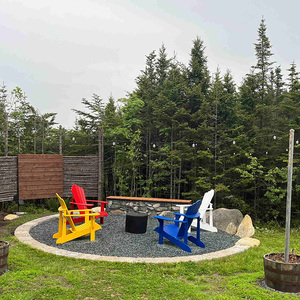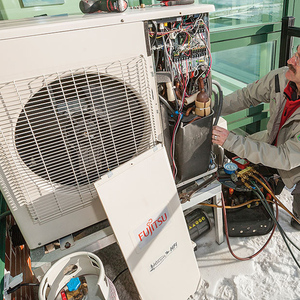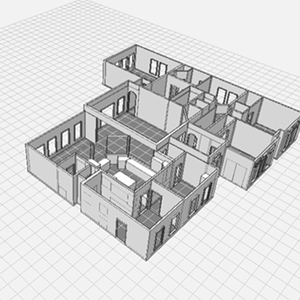Hello,
I am visiting from Knots next door and I was hoping you guys could help me with a flooring issue. My wife and I (actually she is because I am still out of the country) are tearing out our kitchen floor and it looks damp and has a musty smell.
We live in Houston, Texas and we have a cement foundation. The flooring is rolled laminate that was glued straight to the cement. We don’t know how long the flooring has been down but she said that it was coming up really easy, the floor looked like it had been damp before (but not now), it has a musty smell and there are a quite a few black spots on the floor and there was some discoloration on the linoleum but she isn’t sure if they were above the black spots.
Now, we are doing the demo work but we are having a contractor come in to lay the ceramic tile. Is there something that I need to make sure they do? Do I need to seal the floor or something?
Any help will be appreciated.
Steve
Discussion Forum
Discussion Forum
Up Next
Video Shorts
Featured Story

Join some of the most experienced and recognized building professionals for two days of presentations, panel discussions, networking, and more.
Featured Video
Video: Build a Fireplace, Brick by BrickHighlights
"I have learned so much thanks to the searchable articles on the FHB website. I can confidently say that I expect to be a life-long subscriber." - M.K.
Fine Homebuilding Magazine
- Home Group
- Antique Trader
- Arts & Crafts Homes
- Bank Note Reporter
- Cabin Life
- Cuisine at Home
- Fine Gardening
- Fine Woodworking
- Green Building Advisor
- Garden Gate
- Horticulture
- Keep Craft Alive
- Log Home Living
- Military Trader/Vehicles
- Numismatic News
- Numismaster
- Old Cars Weekly
- Old House Journal
- Period Homes
- Popular Woodworking
- Script
- ShopNotes
- Sports Collectors Digest
- Threads
- Timber Home Living
- Traditional Building
- Woodsmith
- World Coin News
- Writer's Digest


















Replies
Greetings and welcome to BT Steve,
A couple of suggestions. Fill out your profile by clicking on your screen name.
Ask/tell your wife to take some clear photos and send them to you. You resize them, then post them so we're all talking about something we can see.
Break up your post into easily readable segments, small paragraphs, no more than three-four lines each.
So, to summarize (correct me if I get something wrong):
1. You're giving us a second hand description based on what your wife is telling you on the phone.
2. Your house is on a concrete slab.
3. The sheet linoleum is being removed by your wife in anticipation of having a new ceramic tile floor installed.
4. There's evidence of mold under the old linoleum but the floor is dry.
5. You'd like to know what caused it and what to do about it, prior to the tile contractor beginning work.
Is that about right? If not, say so.
Hello HVC,
I checked my profile and it is the same as it always has been, except for the age (just a reminder that I am getting older).
I will be getting home in a few days so I will post pictures then.
To answer your summary:
1 - yes the information is second hand via messenger.
2 - yes the foundation is concrete slab above grade and since water doesn't stand around the house I assume the drainage is fine.
3 - Yes, sheet linoleum out and ceramic tile coming in.
4 - Yes, small patches of mold here and there and a musty smell but the floor is dry to the touch.
5 - Yes, I would like to know the cause and remedy please.Thanks for your patience and help.
Steve
Try the plastic patch test. Get a piece of plastic sheeting a foot or two square. Tape it to the floor tightly around the edges and leave it for a day or two. If you get condensation under the plastic, you have a wet slab. Ditra will solve that problem -- for that room, anyway.
Mike HennessyPittsburgh, PA
Edited 7/29/2008 7:56 am ET by MikeHennessy
Good clarification, makes it much easier to suggest a remedy, even without the photos.
I agree with Mike. The condensation test with a sheet of plastic should tell the story. That's something your wife can do easily, so you should know if you have a problem by the time you get home.
BTW. The mold could have been caused by a water spill, such as a mop bucket getting dumped. It only takes a minute for water to find its way under the linoleum via seams and around the edges.
I guess I outta get some commission from pitching all these things?
http://www.miracote.com/index.php?href=productdetail&id=17
You again?!? With that Miracote stuff!?!
Actually the west coast office already told me that you're their Rocky Mountain Distributor.
Not quite. That's a guy named Jim Rowe.
But I do note that it seems like they could do a better job of informing the trades of what they have to offer.
But seriously, Miracote does have some interesting products.
This moisture barrier I referenced, you can see their disclosure about only "authorized" contractors get the warranty backing.
The reason behind that is the need for quantifying the amount of moisture coming thru the slab. Therefore, an anhydrous Calcium Chloride test needs to be performed first. This measures exactly how much water is coming thru. And you see they specify only up to 15# per 1000 sq ft is allowable. Here's their technical data sheet:
http://www.miracote.com/download/Tab%209%20-%20Miracote%20Data%20Sheets/MVERS%20II%20Code%20MIR%20366%20Rev%205%206%20%20%202008.pdf
That in itself can be a misleading situation. For instance, when I redid my garage floor down there in San Juan Capo, I didn't even think about a vapor barier before the pour. Figgered what the hey, it's gonna be dry anyhow.
About a year later, after allowing some plastic to lay on the ceement while I was working on something else in there, did I notice all of this condensation under the plastic sheeting. Dripping wet. Only after I got someone in there that knew what he was talking about, did I realize the irrigation for the foundation planting was migrating under the footings and coming up thru the slab.
My point for saying this, is the OP's situation may very well result from something similar. Maybe simply a heavy rain from time to time. And if so, a CaCL test was be misleading if done at a dry period. Someone has to observe the conditions to fully understand all of the possible contributing factors.
Other than that, you'd figger I'd at least get a discount on the stuff when I buy it. Noooo.
But I would also imagine there are other manufacturers of similar systems.
Edited 7/29/2008 9:11 pm by peteshlagor
Good post. I always get more out of them when they contain a personal experience, like your garage floor.
So it seems that, in light of the known and unknown facts about the OP's slab, he'd be better off to apply a well bonded sealer before laying the new tile.
BTW, I've tried to do business with another manufacturer of two part concrete sealing products, specifically for roof top parking lots. They reason they gave for only doing business through authorized dealers is liability.
As you must know, those particular products can be very harmful when applied improperly so the company's best remedy to avoid civil prosecution is to make the products available only to those with whom they have a iron-clad contract which absolves them of responsibility.
FWIW I agree with what they told you here - http://johnbridge.com/vbulletin/showthread.php?t=65018&highlight=moisture+slab about Schluter Ditra.
Probably no vapor barrier under the concrete.
Jeff
Jeff,
Their advise sounds nice. Expensive but nice. This makes me wonder about the rest of the downstairs flooring. I have hardwood parquet in the living room and linoleum squares in the game room (All installed by previous owner). They seems to be doing ok (not loose or discolored).
The parquet and vinyl tile may be permeable enough that any moisture is evaporating with out causing damage. The sheet vinyl is pretty much an impermeable membrane and would trap and hold any water that gets under it.
Well, you've gotten some interesting data so far.
Some slight more information might help. How long have you been in this house, and do you have an idea when it was built?
Kingwood took some heavy rain loads during Aliesha and Allison, enough rain that, even with a vapor barrier under the slab, water could have wicked in the exposed sides and up to the bottom of the flooring.
This is something I got to experience during Aliesha, most of 100 miles north of Kingwood when we set the record 24-hour rainfall record of 17.28"--the fourplex I was in started having water seep up through the slab. But, you had to be there to know that, too.
When you say linoleum, do you mean individual tiles, or a continuous sheet of flooring? Sheet flooring, vinyl or linoleum, can hold moisture in while curing, especially in a damp climate like Kingwood has all but about two months of the year.
If you were having issues under the parquet, you'd likely know by now, as smaller pieces would be loose and complaining when stepped upon. The glued-together "tiles" of parquet that became very popular in the 80s had a notoriously short lifespan in Harris county. Sometimes they'd unglue from above; sometimes from below, too.